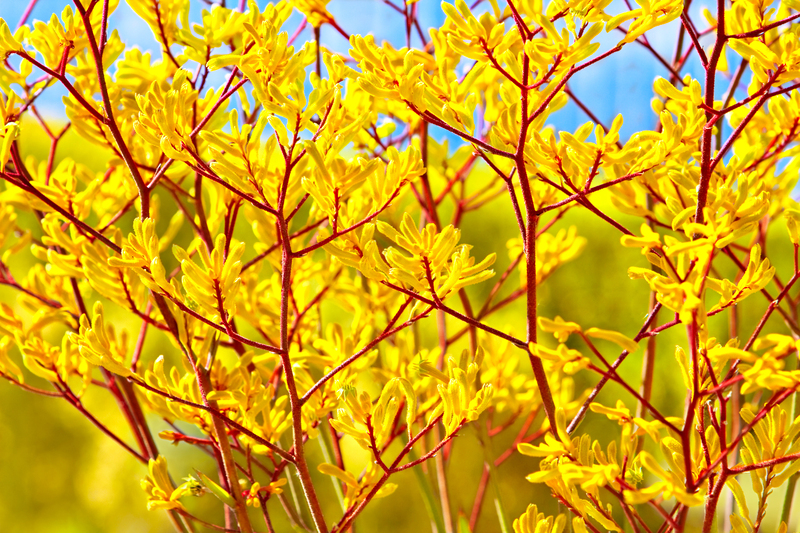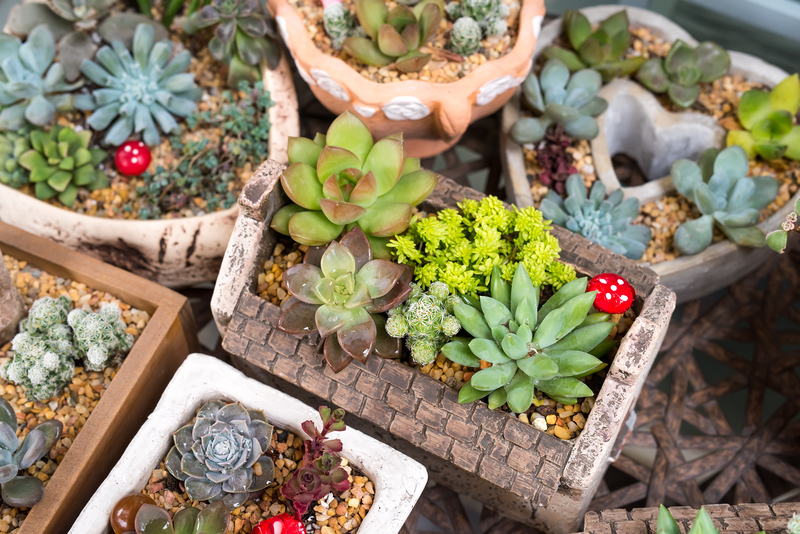Revolutionizing Gardening with Organic Waste Soil Enrichment
Posted on 11/06/2025
Revolutionizing Gardening with Organic Waste Soil Enrichment
Imagine transforming everyday kitchen scraps into a potent elixir for your garden -- all while reducing landfill waste and nurturing a thriving ecosystem. Welcome to the world of organic waste soil enrichment, a practice that's changing the face of modern gardening forever.
Understanding Organic Waste Soil Enrichment
At its core, organic waste soil enrichment involves harnessing the power of decomposed natural matter -- like food scraps, yard trimmings, and leaves -- to supercharge garden soils with essential nutrients. This process is not just an eco-friendly trend, but a vital method for gardeners striving for healthier plants, higher yields, and a more sustainable future.
What Is Organic Waste?
- Kitchen scraps (vegetable peelings, coffee grounds, eggshells)
- Yard waste (grass clippings, leaves, small branches)
- Paper products (unbleached paper towels, napkins, cardboard)
- Biodegradable household waste
When these materials break down, they become rich in nutrients that plants crave, forming the basis of sustainable soil enrichment.

Why Is Enriching Soil with Organic Waste Revolutionary?
Traditional gardening methods have relied heavily on chemical fertilizers and pesticides, which can deplete soil life, harm biodiversity, and pollute the environment. Organic waste soil enrichment turns the tables by:
- Recycling waste that would otherwise end up in landfills
- Reducing reliance on synthetic inputs
- Building healthier, more resilient soils
- Fostering biodiversity both above and below ground
Simply put, this approach offers a holistic solution that serves the gardener, the environment, and the broader community.
The Science Behind Organic Waste Soil Enrichment
All life in the garden -- from worms and beetles to fungi and bacteria -- depends on organic matter cycling. When you enrich your garden soil with organic waste, you set in motion powerful biological processes:
- Decomposition: Microbes and soil critters break down organic materials, releasing vital nutrients.
- Humus formation: Decomposition results in humus, a stable, crumbly substance that supports fertility and moisture retention.
- Nutrient cycling: Plants absorb nutrients, grow, and eventually return organic matter to the soil -- completing the cycle.
Key Soil Benefits
- Enhanced fertility: Organic matter supplies nitrogen, phosphorus, potassium, and trace minerals.
- Improved structure: Enriched soils become fluffy and well-aerated, supporting strong root development.
- Water retention: Organic-matter-rich soils hold moisture, reducing irrigation needs.
- Boosted microbial activity: Healthy soils teem with beneficial life that suppress disease and break down toxins.
Effective Methods for Organic Waste Soil Enrichment
There's no one-size-fits-all approach. From composting to mulching, gardeners can select the method that best suits their space, resources, and goals:
1. Composting
Composting is the backbone of organic waste soil enrichment. By creating a pile or bin for food scraps and yard debris, you facilitate controlled decomposition. The resulting compost can be mixed into garden beds, top-dressed around plants, or brewed into liquid fertilizers (compost tea) for fast foliar boosts.
2. Vermicomposting
This method employs special composting worms (typically red wigglers) to break down organic waste quickly and efficiently, creating worm castings -- a supercharged fertilizer packed with plant-available nutrients.
3. Mulching with Organic Materials
Applying layers of shredded leaves, grass clippings, or straw on top of garden soil offers a dual benefit: immediate weed suppression and slow-release fertilization as the mulch decomposes.
4. Sheet Composting (Lasagna Gardening)
This technique involves layering organic materials directly onto new or existing garden beds. Over time, the layers decompose in place, enriching the soil right where you grow.
5. Bokashi Fermentation
Bokashi is an anaerobic fermentation technique, breaking down a wider range of kitchen waste (including meat and dairy) via inoculated bran. The pre-composted material is then dug into garden beds to complete decomposition.
Practical Steps for Getting Started
Are you ready to join the gardening revolution with organic waste soil enhancement? Here's a step-by-step guide for transforming waste at home into garden gold:
- Assess your space and resources: Decide whether you want to start with a compost bin, vermicomposting system, or simple mulch pile.
- Collect organic waste: Set up a kitchen caddy for scraps and keep yard clippings out of the trash.
- Choose your enrichment method: Will you go for traditional composting, or experiment with bokashi or worm composters?
- Layer and maintain: Add "greens" (nitrogen-rich) and "browns" (carbon-rich) in appropriate ratios and maintain moisture and aeration.
- Harvest and use: Once decomposition is complete, spread the finished organic matter around your garden for maximum effect!
Pro tip: Never add diseased plant matter or pet waste to your compost, as it can introduce pathogens.
Best Practices for Maximizing Soil Enrichment
Balanced Inputs Are Key
For optimal results, it's crucial to balance nitrogen-rich "greens" (like fruit peels and grass clippings) with carbon-rich "browns" (like dead leaves, straw, and shredded paper). An ideal compost pile should have about 2, 3, or 4 parts carbon to 1 part nitrogen.
Maintain Moisture and Aeration
Compost microbes thrive in moist (but not soggy) environments. Turn your pile regularly to supply oxygen and speed up decomposition, or use a tumbler composter for convenience.
Fine-Tune with Natural Amendments
Enhance your soil enrichment process with organic additives such as:
- Rock dusts (for minerals)
- Biochar (boosts microbial life and water retention)
- Green manures (cover crops turned under to add organic matter)
The Environmental Impact of Organic Waste Enrichment
One of the most significant benefits of harnessing organic waste for soil enrichment is its environmental footprint. Here's how this gardening revolution helps:
- Reduces landfill waste: Food scraps and yard waste make up more than 30% of typical household garbage. Composting diverts this waste into soil-building action.
- Mitigates greenhouse gases: When organic waste rots anaerobically in landfills, it produces methane -- a potent greenhouse gas. Composting dramatically reduces these emissions.
- Protects water quality: Healthy, organic-matter-rich soils filter and retain water, reducing runoff and soil erosion.
- Fosters backyard and community biodiversity: Rich soils support earthworms, pollinators, and beneficial microbes, forming the basis of healthy food webs.
Organic Waste Soil Enrichment in Urban and Community Gardens
Revolutionizing gardening is not just for suburban or rural homesteads. Urban gardeners, community plots, and balcony growers are equally positioned to benefit. Many cities now have curbside organics collection, and dozens of community gardens incorporate composting and mulching techniques to improve urban soils. Even small spaces can use worm bins or bokashi systems, while shared gardens can quickly scale these solutions.
Success Stories and Innovation
- School gardens: Teaching future generations the value of organic waste recycling and sustainable gardening.
- Urban farms: Closing the food loop by returning food scraps to the soil, leading to higher yields and lower operating costs.
- Municipal initiatives: Cities providing finished compost to residents or community groups for free or at low cost.
In these contexts, garden productivity, community cohesion, and environmental stewardship grow hand-in-hand.

Frequently Asked Questions about Organic Waste Soil Enrichment
What can I compost for soil enrichment?
Most fruit and vegetable scraps, coffee grounds, eggshells, yard clippings, leaves, tea bags, shredded paper, and cardboard are safe. Avoid meat, dairy, oily foods, and pet waste unless you use specialized systems like bokashi.
How fast can I see results in my garden?
Depending on your method and climate, composting can take from 2 months (hot composting) to a year (cold composting or sheet mulching). However, you'll notice improved plant vigor and soil texture even with regular mulching over one or two growing seasons.
Are there any drawbacks to using organic waste in soil?
If improperly managed, compost piles may attract pests or produce odors. Proper layering, aeration, and avoiding animal-derived waste will prevent most issues. Never apply fresh, undecomposed organic waste directly onto delicate plants, as it can create heat and potentially "burn" roots.
What's the difference between compost, manure, and mulch?
- Compost: Decomposed organic matter, ready for soil incorporation.
- Manure: Animal dung (should be properly aged or composted to kill pathogens).
- Mulch: Organic or inorganic materials applied to the soil's surface to protect and feed the soil as it breaks down.
The Future of Gardening with Organic Waste Soil Enrichment
The time is ripe for revolutionizing gardening through organic waste soil enrichment. Whether you are a backyard enthusiast, a community gardener, or an urban balcony grower, you can take part in this movement -- turning waste into abundance and cultivating a healthier, more resilient environment. As awareness grows and technologies advance, expect even more accessible solutions and stronger support for organic waste recycling at local and global levels.
Ready to start your own soil revolution? Transform kitchen scraps and yard waste into thriving, fertile garden beds -- and join millions of gardeners worldwide who are making the world greener, one handful of compost at a time!
Revolutionize your garden and nurture the planet -- enrich your soil with organic waste today!
```Latest Posts
Tips for Designing a Child-Friendly Backyard Retreat
Unleash Creativity with Vertical Garden Designs
Harnessing Nature to Reduce Wind in Your Garden

